|
|
|
Sort Order |
|
|
|
Items / Page
|
|
|
|
|
|
|
| Srl | Item |
| 1 |
ID:
178516
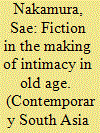

|
|
|
|
|
| Summary/Abstract |
Theoretical debates around the study of ‘kinning’, or emergent intimacies, have usually centred on parent–child relationships, while the later stages of life have largely been ignored. The author suggests that one of the fundamental dilemmas in later-life-kinning lies in the ‘means-ends dichotomy’ and argues that ‘fiction’ may help people to creatively tackle this dichotomy. Ethnographic data were collected from Sri Lanka, where the elderly are prompted to rearrange and/or extend their care relationships, both within and beyond the boundaries of family, against the backdrop of dynamic socio-demographic changes. Evolving in a relatively informal fashion, these activities to rearrange and extend care relationships often involve the direct/indirect mediation of money. Undertaking a detailed case study of an elderly woman, Dorothy, and her caregiver-cum-’kin’ Piyadasa, the author aims to illustrate how fiction enables us to face unfathomable situations or fundamental contradictions – in this case, a means-ends dichotomy. Contrary to the assertion that fiction in the process of kinning can help one define or ‘discover’ a destined, permanent relationship to form a ‘pseudo-biological’ relationship as suggested in previous research on adoption, this paper demonstrates how fiction can help us dwell in uncertainty and gradually reshape our relationships to one another.
|
|
|
|
|
|
|
|
|
|
|
|
|
|
|
|
| 2 |
ID:
178517
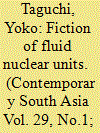

|
|
|
|
|
| Summary/Abstract |
Fictions that account for nature-culture have always been crucial for the anthropology of kinship, but the significance of fiction has increased through the extension of new technologies and global transactions. This paper examines the dynamics of householding relations in Mumbai through the lens of fiction. A contemporary middle-class household in India is a rich field of study, as it is filled with the memories of family retailers, the responsibilities and expectations of family members as well as of domestic workers and their families, and the uncertain relations of everyday life. As recent literature on domestic work and servitude suggests, these complex relations also reflect historical inequalities. By focusing on paid domestic work, this paper not only examines external inequalities but inquires into the generation and potential transformation of households and of kinship itself. It then illustrates how domestic work with entangled social imaginaries creates a new image of family, one which does not simply reflect a shift from the feudal to the modern, or from joint family to nuclear family, but rearticulates relations by evoking various fictions.
|
|
|
|
|
|
|
|
|
|
|
|
|
|
|
|
| 3 |
ID:
178520


|
|
|
|
|
| Summary/Abstract |
The Geographical Indications of India Act requires a detailed description of ‘authorized users’ and ‘producers’ without concern for how these ‘producers’/ ‘authorized users’ are identified and what are the outcomes of such identification. Artisans identified as producers of GI registered ‘Cheriyal Painting’ of Telangana primarily belong to one genetically related family. Apart from members of the Danalakota household, GI also enumerates families of apprentices as ‘producers’. This article will highlight two things. First, it will demonstrate the way in which identification of ‘producers’/ ‘authorized users’ replicates not only the relational worlds within which producers exist but also the ‘obligations and moral imperatives’ embedded within those relations. Second, identifying oneself as a ‘producer’/ ‘authorized user’ requires distinguishing and individualizing one’s relatedness with the Danalakota family; promises of welfare by the state then become accessible only by becoming kin and distinguishing oneself as kin.
|
|
|
|
|
|
|
|
|
|
|
|
|
|
|
|
| 4 |
ID:
178514
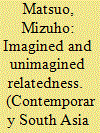

|
|
|
|
|
| Summary/Abstract |
This paper examines the ways in which egg donors, surrogate mothers, and intended parents in India imagine and unimagine their relationship with children born through third-party reproduction. Third-party reproduction is inseparable from plural parenthood and the question of who the ‘real’ parents are. In a legal and medical context, gestational surrogacy in India treats surrogates as not ‘real’ mothers, in favour of the ‘natural’ relationship between the intended mother and child. Here, the ‘genetic tie’ may ignore gestation in giving predominance to ‘genes’, but this logic is inverted in the case of egg donation, in which it is not uncommon for people to regard egg donors as ‘real’ mothers. Who is regarded as a ‘real’ parent, and who is not, is deeply embedded in the social process of creating kinship, shared notions of bodily substances, corporeal reality, and social recognition of ‘one’s own child’. The elements of gestation, genetic relations, and nurturing compete and coexist in the practice of third-party reproduction. This paper explores the multiple aspects of ‘real’ and ‘fictive’ kinship and its entanglement in making ‘a child of one’s own’ in third-party reproduction in India.
|
|
|
|
|
|
|
|
|
|
|
|
|
|
|
|
| 5 |
ID:
178519


|
|
|
|
|
| Summary/Abstract |
This article explores inter-caste/religious (ICR) marriages in Kerala (South India) and focuses on the meanings and experiences of kinship when the latter is devoid of its expected emotional and relational substance, to become a ‘public fiction’. With this expression, I refer to kinship relations accepted in the public sphere, but which denied affective and material foundations in the everyday life. ICR marriages hold an important socio-political role in Kerala as symbols of the State’s development, and family ostracism is scrutinised as a form of backward communalism. However, relatives are not always willing to build relations with ICR kin. This leads to ICR families managing situations where public kinship tolerance co-exists with the negation of its real emotional and intimate possibilities. The article maps how the reality of ICR marriages is turned into a fiction by persisting unspoken norms. It suggests the importance of linked discussions on fiction/ reality in the domestic sphere to the public/political role that kinship and families hold in modern postcolonial Kerala.
|
|
|
|
|
|
|
|
|
|
|
|
|
|
|
|
| 6 |
ID:
178513
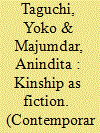

|
|
|
|
|
| Summary/Abstract |
This special issue brings together emerging studies on kinship in South Asia and explores the idea of kinship as ‘fiction’ through ethnographic analysis of intimate relationships. Anthropology had long considered kinship as ‘natural’ or ‘biological’, thereby rendering other relations as ‘real’ or ‘fictive’. However, the recent ever-expanding scope of the ‘new kinship studies’, through the mapping of socio-technological changes, including the development of new reproductive technologies, the expansion of a diverse marriage system, and the global reconfiguration of care work, has brought a new dynamism to the discipline. Drawing both on traditional South Asian kinship studies and on more recent theories in anthropology, care work, medicine and science and technology studies, Kinship as Fiction offers insights on how ‘nature’ and ‘culture’ are related, translated, and regenerate each other by changing their meanings and forms. Fiction plays an important role in shaping reality, by making emerging worlds comprehensible, and helping us to imagine relations differently. This special issue investigates how particular ‘fictions’ are narrated and enacted within the constraints of reality, and how reality is, in turn, generated by fiction in the context of kin and other intimate relationships.
|
|
|
|
|
|
|
|
|
|
|
|
|
|
|
|
| 7 |
ID:
178518
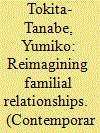

|
|
|
|
|
| Summary/Abstract |
This paper examines how family, kin and other intimate relations are reimagined and reconstructed in contemporary India. I introduce the concept of ‘intimate networks’ to analyze connections between villages, cities and abroad, looking at ways in which people create familial relationships in and across various spatial locations. I argue that there is a shift away from traditional norm of emphasizing patriliny and primogeniture to broadening kin and personal relations, including lateral kin and affines, acquaintances and friends to seek opportunities for education and employment. There is a circular flow of people, things, cash and information between villages, cities and abroad, rather than a unilateral migration from rural to urban, as traditional modernization theory advocates. Circular flow is made possible by construction of intimate networks involving exchanges and flow of substance-codes, such as things, cash and information between people. I also examine emergence of new relationships of care beyond family and kin ties in rurban areas where residents combine aspects of rural and urban in ways that defy assumptions of straightforward modernizing transition from rural to urban.
|
|
|
|
|
|
|
|
|
|
|
|
|
|
|
|
| 8 |
ID:
178515
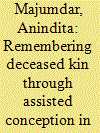

|
|
|
|
|
| Summary/Abstract |
In this paper, I examine the idea of fiction in relation to kinship by analyzing the role that memory plays in assisted reproduction in North India. I specifically engage with the desire to seek the intervention of in-vitro fertilization after the loss of a child, mostly sons, through an accident, prematurely. In the process, the paper engages with the kind of narratives that birthing women remember and speak of in seeking the ‘rebirth’ of their dead sons, and what this means for kinship per se. This is especially important in relation to the conflicts and ambivalence that mark intimate relationships; and the ways in which the IVF clinic and clinician seek to reimagine them in facilitating assisted conception. I suggest that the narratives surrounding these rebirths act as effective and powerful messages for normalizing IVF, and also to hide other forms of relatedness that come to mark conflicting, ambivalent and yet, deeply intimate relationships.
|
|
|
|
|
|
|
|
|
|
|
|
|
|
|
|
|
|
|
|
|